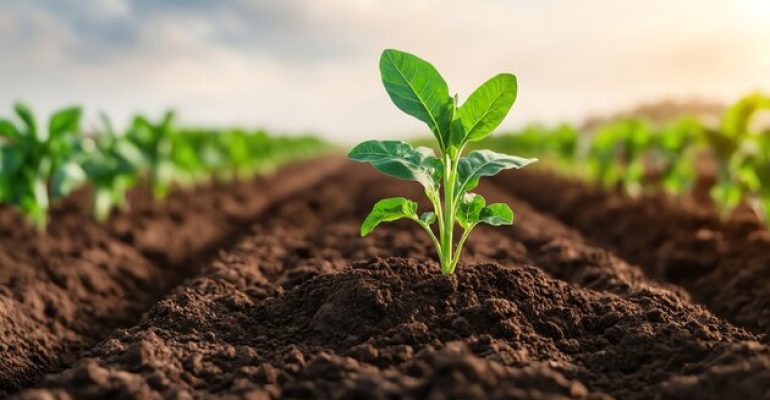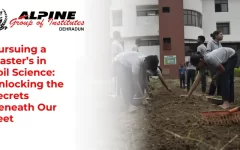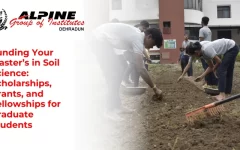What You Can Expect from a Master’s in Soil Science: Curriculum, Skills, and Opportunities
2024-11-21 11:36What You Can Expect from a Master’s in Soil Science: Curriculum, Skills, and Opportunities

What You Can Expect from a Master’s in Soil Science: Curriculum, Skills, and Opportunities
A Master’s in Soil Science is an exciting, interdisciplinary graduate program that delves deep into the complexities of soil, one of the Earth’s most vital natural resources. Whether you are drawn to the field by an interest in agriculture, environmental science, or sustainability, this degree offers both practical and academic training to address some of the world’s most pressing challenges, such as soil degradation, climate change, and food security.
Core Curriculum: Building a Strong Foundation in Soil Science
The curriculum of a Master’s in Soil Science typically includes both core courses and electives that cover a wide range of subjects. These courses are designed to provide you with a comprehensive understanding of soil’s chemical, physical, and biological properties, as well as how soils interact with the environment and human activities.
Key Topics in the Curriculum
Soil Physics:
You’ll study the physical properties of soil, including texture, structure, porosity, and permeability. Understanding how water, air, and heat move through soil is crucial for improving soil management practices, especially in agriculture.
Soil Chemistry:
This course covers the chemical composition of soils, including nutrient cycling, pH, and how soils interact with fertilizers and pollutants. You’ll learn how to optimize soil conditions for plant growth and combat soil degradation.
Soil Microbiology:
Soil is teeming with microscopic life. This course explores the role of soil microorganisms in nutrient cycling, organic matter decomposition, and the overall health of ecosystems. You’ll learn how microbes can be used to improve soil health and fight diseases.
Soil Fertility and Nutrient Management:
Understanding soil fertility is key for sustainable agriculture. You’ll learn how to assess nutrient needs, manage soil amendments, and optimize soil conditions for different crops.
Soil Conservation and Erosion Control:
This course focuses on sustainable land management practices to prevent erosion, desertification, and soil degradation. You’ll study various techniques like contour farming, terracing, and agroforestry.
Environmental Soil Science:
Topics here might include soil pollution, heavy metals, contaminants, and the role of soils in mitigating environmental issues like climate change and water quality.
Soil and Water Management:
You’ll examine the relationship between soil, water, and plant growth, with an emphasis on sustainable irrigation practices and water conservation strategies.
Elective Courses
Many programs offer elective courses that allow you to specialize in a specific area of interest, such as:
Agroecology:
Understanding how agricultural systems interact with the environment.
Soil Remediation:
Techniques for restoring contaminated soils.
Land Reclamation:
Methods for rehabilitating degraded or contaminated land.
Urban Soil Science:
Addressing challenges in soil management within cities, including green infrastructure and urban agriculture.
2. Hands-on Learning: Field Research and Laboratory Work
A major strength of a Master’s in Soil Science is its emphasis on practical, hands-on learning. Through laboratory experiments, field research, and internships, you will develop the technical skills needed to assess, monitor, and improve soil health.
Laboratory Work
Lab work is an essential component of the program, allowing you to apply theoretical knowledge to real-world soil samples. You may:
- Analyze soil samples for texture, nutrient content, and pH.
- Perform chemical tests to understand how different fertilizers affect soil.
- Use soil sensors and other technology to measure soil properties like moisture levels, compaction, and temperature.
This hands-on experience is crucial for honing your analytical skills and preparing you for professional soil science roles, whether in research, agriculture, or environmental consulting.
Field Research
Soil science is inherently field-based, and most programs offer opportunities for fieldwork where you can directly apply what you’ve learned. Some field experiences might include:
Soil Mapping and Surveying:
You’ll have the chance to work on soil surveys, mapping different soil types across a region, and understanding how soil properties vary with geography and climate.
Soil Sampling:
Field research often involves collecting soil samples from various environments (farmlands, forests, wetlands) to test for fertility, contamination, or other factors affecting soil health.
Restoration Projects:
Some programs involve students in real-world soil restoration projects, like reclaiming polluted lands or implementing soil erosion control measures.
Field research helps you gain practical experience in analyzing and improving soil in diverse environmental settings, enhancing your problem-solving and data collection skills.
3. Thesis Project: Original Research and Innovation
A key component of most Master’s in Soil Science programs is the thesis project. This is an opportunity to conduct independent research in a specific area of soil science that interests you. Whether you’re studying soil fertility, the impact of climate change on soil health, or the best methods for soil remediation, your thesis will allow you to:
Contribute New Knowledge:
You’ll explore a research question or problem that adds to the existing body of knowledge in soil science, possibly leading to innovative solutions for sustainable land use or agriculture.
Develop Research and Analytical Skills:
Through your thesis, you’ll learn how to design experiments, analyze data, and communicate your findings clearly. These skills are highly valued in academic, government, and private sector roles.
Collaborate with Experts:
Your thesis work often involves collaboration with faculty members or industry professionals, giving you the chance to work alongside experts in the field and build valuable professional connections.
4. Skills You’ll Develop
Throughout your Master’s in Soil Science, you’ll acquire a range of technical, analytical, and communication skills, including:
Soil Analysis and Testing:
You’ll learn how to collect, process, and interpret soil samples for various properties, including nutrient content, pH, organic matter, and contamination.
Geospatial Technology:
Many soil science programs incorporate Geographic Information Systems (GIS) to help you map soils, analyze spatial data, and manage land resources effectively.
Problem-Solving and Critical Thinking:
Soil science involves a lot of problem-solving, whether it’s designing soil management practices for farmers or determining the best method for land reclamation. Critical thinking skills are vital for addressing complex environmental challenges.
Project Management:
With fieldwork, lab work, and your thesis, you’ll gain experience managing research projects, from developing a hypothesis to collecting data and presenting your findings.
Communication Skills:
As a soil scientist, you will need to explain complex technical concepts to non-experts, whether that’s farmers, policy-makers, or the public. Clear writing and presentation skills are crucial for success in this field.
5. Opportunities for Professional Development
In addition to the technical skills and knowledge, a Master’s in Soil Science can open doors to a variety of professional development opportunities:
Internships:
Many programs offer internships with government agencies, environmental consultancies, agricultural firms, or research institutes, allowing you to gain real-world experience and build your professional network.
Conferences and Workshops:
Graduate programs often encourage students to attend or present at soil science conferences, providing valuable exposure to the latest research and a platform for networking with experts in the field.
Certifications:
Depending on your career interests, you may also have the opportunity to earn certifications in soil science, agronomy, or environmental management, further enhancing your employability.
Conclusion
A Master’s in Soil Science is a dynamic, hands-on program that prepares you to tackle some of the most urgent environmental and agricultural challenges facing our planet. With a combination of rigorous coursework, field research, lab experiments, and a thesis project, you’ll gain a comprehensive understanding of soil’s role in ecosystems and human society. Whether you’re passionate about sustainable agriculture, environmental restoration, or climate change mitigation, this graduate degree equips you with the skills and knowledge to make a real-world impact.
By the end of the program, you’ll not only have an advanced understanding of soil science but also the practical skills and research experience that will position you for a successful career in academia, industry, government, or consultancy. If you’re eager to be part of the solution to global environmental challenges, a Master’s in Soil Science offers a pathway to meaningful and impactful work.





